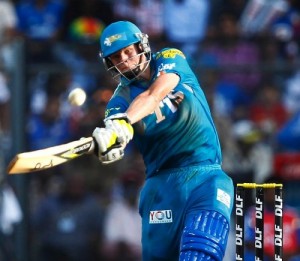
A gradual but inevitable descent into cricket-based loathing and bile.
David Warner Against The World
It’s a sad day for Australian sport when it needs to rely on someone like David Warner to defend its integrity, but owing to the repugnant standard of journalism currently endorsed by some of the country’s leading newspapers, that is exactly where we are today. We are guessing none of the staff employed at the paper responsible for publishing Robert Craddock’s missive against the IPL can claim an alma mater as prestigious as Matraville High (which, we are reliably informed, lacks any text books written after the fall of the Berlin Wall), but Warner still displayed a far better grasp of journalistic ethics than any of them.

You can tell it’s not a serious school by the absence of a wanky Latin motto on it’s crest.
Employing the over-used (but in this instance apt) cliché, Warner is your typical street fighter. He rose from obscure beginnings (he made his international debut before playing First Class cricket, as Mark Nicholas so frequently likes to remind us) to become an indispensable member of the Australian outfit across all three formats purely owing to his refusal to go down without a fight. Sure, now that he is established at the highest level it would be nice to see him develop the ability to deal with adversity via means other than trying to bludgeon it to death, but that would downplay just how impressive a feat it has been for Warner to rise so far, so fast. And at 26 years of age, there is still time for him yet (although we’re honestly not holding our breath).
We are sure Craddock’s missive against the IPL wasn’t intended to be an attack on Warner personally, but it was so ham-fisted, so appallingly written, that it’s not difficult to see how Warner could come to that conclusion. In his opening line Craddock describes the competition as a ‘smouldering cesspit’, which pretty much tells you everything you need to know about the author’s intentions. According to Craddock nobody who plays in the IPL would be the least bit surprised at the spot fixing allegations, presumably implying that the competition is rife with the practice. A set of affairs not helped by, in Craddock’s words, the fact that ‘ICC’s corruption unit have had about as much success finding criminals as Mr Magoo would have spotting a flea in a featherbed.’
There is nothing about this article to suggest that it’s not just yet another Australian journalist making the most of an opportunity to bash the IPL. There is nothing constructive in it, no reasoned critiques of the tournament, no quotes, statistics, names, anything. Just a page of utter bile. But on top of this it is so poorly written, so rife with sweeping statements, that it manages to undermine the credibility of all participants of the IPL, not just those the subject of criminal investigations, suggesting that seemingly if they are not engaging in illegal activities, they are just ‘lying around five star hotel rooms’.
It’s no surprise, therefore, that Warner took offense at the author’s sweeping condemnations of the league. If Warner hadn’t we can only hope someone else would have. The IPL is clearly not everybody’s cup of tea. The most interesting feature of this year’s edition was the record time in which the Pune Warriors managed to retain the wooden spoon, an accomplishment so stunning the trophy ought to be retired so it can take up a place of honor in the Subrata Roy Stadium. But whether the IPL interests you or not, to condemn it with invective of this caliber is just infantile. Yes, the IPL has some serious issues that it needs to confront, and, no, claiming they are the work of ‘a few bad eggs’ is not the way to go about it. But if its critics could actually put their prejudices aside for a moment, they would see there is a lot to admire as well in what is easily the world’s premier T20 competition.

The IPL features Steven Peter Devereux Smith, so of course it’s good.
But that would require actual effort. Far better to simply throw together a cliché ridden, arrogant, mess of an article than try and actually engage with some of the issues world cricket is confronting. And as much as some blinkered journalists would like ignore it, the IPL represents an extremely important part of today’s international cricketing landscape.
Warner was entirely within his rights to take to task an article that so flippantly undermined the competition in which he, and seemingly many, many others, participate without resorting to illegal practices or exhibiting rank unprofessionalism. Sure he could have been a little more tactful in his response; calling the journalist responsible a ‘jealous prick’ was perhaps pushing things a bit, but his identification of Craddock’s article as ‘crap’ was bang on the mark. We bet his old English teachers back at Matraville High would be proud.
And as for Malcolm Conn’s pithy remark that the exchange did nothing but underline why Warner had been overlooked for the Test vice captaincy, he quite possibly couldn’t be more wrong. The ability to engineer an ‘us against them’ mentality may well be one of the prime assets the national selectors are looking for in a successor to Michael Clarke. As lacking in diplomatic tact as he may be, Warner is someone who has no time for laziness, questionable ethics, or slovenly standards. As this incident has so effectively demonstrated.

No Comments
Post a Comment